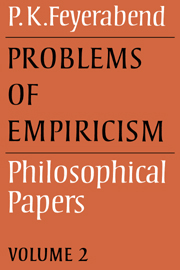Book contents
- Frontmatter
- Contents
- Introduction to volumes 1 and 2
- 1 Historical background
- 2 Classical empiricism
- 3 The structure of science
- 4 Two models of epistemic change
- 5 Philosophy of science versus scientific practice
- 6 Mach, Einstein and the Popperians
- 7 Wittgenstein's Philosophical Investigations
- 8 Consolations for the specialist
- 9 Popper's Objective Knowledge
- 10 The methodology of scientific research programmes
- 11 More clothes from the emperor's bargain basement
- Sources
- Name Index
- Subject Index
11 - More clothes from the emperor's bargain basement
A review of Laudan's Progress and its Problems
Published online by Cambridge University Press: 05 June 2012
- Frontmatter
- Contents
- Introduction to volumes 1 and 2
- 1 Historical background
- 2 Classical empiricism
- 3 The structure of science
- 4 Two models of epistemic change
- 5 Philosophy of science versus scientific practice
- 6 Mach, Einstein and the Popperians
- 7 Wittgenstein's Philosophical Investigations
- 8 Consolations for the specialist
- 9 Popper's Objective Knowledge
- 10 The methodology of scientific research programmes
- 11 More clothes from the emperor's bargain basement
- Sources
- Name Index
- Subject Index
Summary
LAUDAN'S MODEL
In his book Progress and its Problems Laudan presents a model of rationality that is wide enough to cover ‘all intellectual disciplines’ (13), but he explains it via a discussion of its ‘most successful instance’, science (13). The model is simple and apparently quite powerful. It is one of those ideas which at first sight seem hardly worth a glance (11) but which reveal their fertility when developed in detail.
According to Laudan (scientific) knowledge arises from the attempt to solve problems (13): ‘science is essentially a problem solving activity’ (11; cf. 66). This is the basic postulate. It is explained by showing which entities are involved in problem solving and how the solutions are evaluated.
Problems are solved with the help of theories and research traditions which are sets of ‘general assumptions about the entities and processes in a domain of study and about the appropriate methods to be used for investigating the problems and constructing the theories in that domain’ (81, original italics omitted).
Theories and research traditions are evaluated by their problem-solving propensities (14). The evaluation is comparative (71) ‘what matters is not, in some absolute sense, how effective … a tradition or theory is but, rather, how its effectiveness … compares with its competitors’ (120): one chooses ‘the theory (or research tradition) with the highest problem solving adequacy’ (109).
Information
- Type
- Chapter
- Information
- Problems of EmpiricismPhilosophical Papers, pp. 231 - 246Publisher: Cambridge University PressPrint publication year: 1981
Accessibility standard: Unknown
Why this information is here
This section outlines the accessibility features of this content - including support for screen readers, full keyboard navigation and high-contrast display options. This may not be relevant for you.Accessibility Information
- 5
- Cited by
